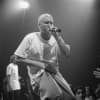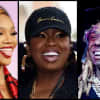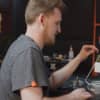Oakland's Too Short has been rapping longer than many rappers have been alive, and he remains one of hip-hop's most craft-conscious entertainers. No Tresspassing, his 19th studio LP, is out today. It comes on the heels of lots of positive press from most major hip-hop outlets, and one of Short's his first-ever New York concerts.
While the lewd rapper is no stranger to controversy, when XXL posted a video interview in which Short offered teen boys sex advice on their site (it has since been removed), he alienated many viewers. Seemingly taken aback by the overwhelmingly negative reaction, Too Short participated in a dialogue with journalist dream hampton for Ebony magazine last week to address the issue.
Prior to the XXL video's appearance, we spoke with an already reflective Too Short. He talked about his earliest performances, making the most of the digital age and whether or not he was, in fact, watching Yo! MTV Raps on the day Ice Cube allegedly had a really good day.
Are you happy with where you are today? I don't think I've ever been just like, happy with life. I live life as a realist. I realize all the good shit and all the bad shit going on, and I deal with it from day to day. But I fucking try to have some kind of fun every day. I don't give a fuck if it's the saddest day ever, I gotta get some kind of laugh in there, I gotta feel good. If I'm around a bunch of people that's sad, I gotta try to make them laugh or come up with something positive out of the emotion that's making you feel negative. I'm not a negative person. I don't hang around negative people. I've had some in my life, but I beat that shit up all the time. I’ve never just been walking around all smiling and happy though.
Have you ever had your heart broken? Not really. But I had some let downs as a little kid. It probably did affect me and helped develop this Too Short persona. But I've broken a few hearts, and I have ended some relationships, or had some relationships that came to an end, and that takes a really long time to get over. That’s happened to me like twice—where if you're trying to move on, shit ain't working. But when it really really really is over, the shit really really really hurts. I've been in love, man. The shit hurts. It's like you're really sick.
What were you trying to do with your song “The Ghetto”? There were a lot of songs that reflected Grandmaster Flash and the Furious Five's “The Message,” which was a brutal tale of ghetto life. So, I'm in Oakland. I'm roaming around the ghetto. And I'm hanging with people who are not complaining about life. No matter where you go—all these houses in the ghetto, there are brand new TVs, new furniture, homeowners, new cars, everybody's got extra money. So I start off each verse on “The Ghetto” saying, Even though. Even though the odds are against you, you can do all this other shit. You can still have shit, you don't have to move out the ghetto to not be ghetto, shit. I wanted to tell the story about how the odds were against you in the ghetto, but I knew a bunch of people who lived good in the ghetto.
Did you ever get involved in politics? Do you consider yourself, in your music or outside of it, a political person? It's not a passion of mine to follow politics. When I deal with political issues in my songs, I just say stuff that's current, only as a songwriter. I could pick a cause right now, or twenty years ago, and preach it through the music. But I’m comfortable where I am as a rapper. I've never been competing with rappers about who's the best rapper. I've been making songs that people like. If I wanted to be a rapper who rapped in metaphors and said slick shit, I could do that. Bu that's not what I want to do. I don't give a fuck who the best rapper is. I don't even want to learn how to freestyle. I don't give a fuck about battling. I'm making songs that people like, and I'm getting on stage singing them songs with people, and I'm having a good damn time doing it.
You have a charismatic stage presence. Did it take work to get comfortable perfoming? I had experience high school, performing my songs at parties. I was learning breath control and what limitations I had if I wrote something that was really hard to recite. I was learning my style. I had a little glitch in my program when I wrote “Freaky Tales.” I used to smoke Newports. I got on stage to sing this long-ass song, and I didn't have the wind for it. I was on stage out of breath, you start sweating, you get dizzy and shit. And I know there's a lot of cigarette smoking rappers, they need a back-up man, all the hype men. Rappers who rap really fast and say a lot of shit, they need the record to play with them because they can't recite that shit back. I wrote my shit so I can say it just like it's on the record. The voice that you hear me rap on the record, I rap that voice on stage too. Like a singer who's true to themselves.
When you started doing shows, what kinds of venues were you getting booked in early in your career? I went from house parties to dances to little theaters. The places hip-hop used to come to. Never a big arena, but some kind of convention center. My first taste of the crowd was always as an opening act—they let you come out there and sing two songs. Get ten minutes and you do a little routine. I always showed up, and every time I got to the stage, in my whole fucking career, everybody always knew the words. I never had to step around. I experimented with dances. I never had a DJ or dancer. All I needed was to play the music, walk out there by myself, and rap that shit. It's the words, man. It's that simple-ass rap.
Do you have advice for rappers now? Social media is really important. When you get your social network numbers up, people jump on the bandwagon. And if you're getting those numbers up, that must mean something good about you. Outside of that, it's still the same game. You've got to get known in the streets. Or you've got to get yourself poppin in the clubs where you live. Or you've got to have some friends at the radio stations out here. If you're famous in your neighborhood, take it over to the next neighborhood. If you're famous in your city, take it to the next city. You can't just sit around, and enjoy your little bit of fame, smoke a little bit of weed and expect your homies to make you rich because everybody out there likes your shit. The people that make it are overachievers. Skill level doesn’t matter. If the music is good, people like it, but that ain’t the deciding factor on if you're going to be one of the greats. It's the overachievers, the motherfuckers like me who live in the studio. Motherfuckers who get on a plane and go any-god-damn-where. I know a lot of people sit around going, Man I've been doing that shit but it ain't working for me. There's a certain magic to it, your timing, your luck and all kind of shit.
Are there any rising artists from Oakland that you've been listening to or think show a lot of promise? I'm launching this thing called Too Short Presents, and it's basically me in the studio in the Bay, sifting through artists to try to find guys who have above-average skills and that it-factor. I just bought a bunch of equipment and we've been shooting videos every day. Instead of putting these songs out and pressing up CDs and shit, I'm just gonna blast a million videos and give out a bunch of promo CDs out in these streets in the Bay and see who clicks. In this day and time, you hand me a CD right now I might not listen to it. But everybody's on the damn computers looking up shit. With the cost of equipment now, the way the HD cameras are playing back quality, it's a whole new game. I'm thinking of making a video album. We've got to start thinking futuristic. What are we gonna do, shit. The digital age is changing rapidly, you've got to get on it.
When you were first coming up, you created a specific production sound with Ant Banks. When G-Funk was getting a lot of media attention, how did you feel your sound fit into the scene? Dr. Dre was an established artist years before I was. Dre always had the big 808 drums, he would always creep in some funky basslines, he'd sample stuff like the Ohio Players and Parliament Funkadelic. We weren't too far apart. I was never trying to out-do Dr. Dre. But when I met all those guys—Snoop and Daz Dillinger and everybody— we started hanging out. It helped me a lot being affiliated with those guys. Me and Ant Banks used to mix our songs, and we would compare the songs in the car to different songs Dr. Dre had released. Like mainly stuff off The Chronic or the Snoop Dogg album. We'd check the EQ and make sure everything was loud and clear.
What was your relationship with Pimp C like? Me and Pimp C, we have so many days and nights in the studio, or just going to hang out somewhere, being on tour on the bus, smoking one or trading stories. Pimp C was like family. He was like a blood relative. He was like my brother. He was so much a part of my life, even before he went to jail—he stayed in jail for four years. We wrote each other a couple times. When he got out we went right back to it. He was one of my favorite people to work in the studio with. He would come in the studio and he'd make you work. He'd be like, "turn on the power, hook up the machine, let's make a song.”
Someone recently went through Ice Cube's “Today Was a Good Day,” and they determined through hints from the lyrics—the Lakers beat the Supersonics, the weather was clear in Los Angeles— that Cube's "good day" was January 20th, 1992. Can you confirm that you were in fact watching Yo! MTV Raps on January 20th, 1992, like it says in the song? I might have been! I watched a lot of Yo! MTV Raps back in the day. It was hip-hop, it was new, it was starting to get really popular. It was on display, our thing.


